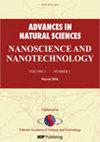作为储能设备负极的铁碳基材料
IF 2.1
Q3 MATERIALS SCIENCE, MULTIDISCIPLINARY
Advances in Natural Sciences: Nanoscience and Nanotechnology
Pub Date : 2024-06-30
DOI:10.1088/2043-6262/ad2c7c
引用次数: 0
摘要
为了为铁基电池阳极找到合适的碳添加剂,我们研究了各种纳米碳纤维(CNF)对铁/碳(Fe/C)复合电极电化学性能的影响。碳的结构和特性(如粒度、表面积)对铁/碳复合电极的循环性能有很大影响。对不同类型的 CNF 结构(人字形和管状)进行了研究,结果表明管状 CNF 具有更高的放电能力。X 射线能量色散光谱(EDS)显示,铁物种在循环过程中分散在碳表面,这可能会改善铁/碳复合电极的电化学性能。在循环过程中,铁物种通过溶解沉积过程在碳表面聚集成大颗粒,从而增加了铁/碳电极的电阻。这一现象导致电极在循环过程中氧化还原电流和放电容量降低。电化学活性材料的类型及其粒度也会影响电极的循环性能。当用 Fe2O3 替代 Fe 时,Fe2O3/C 复合电极的容量大于 Fe/C 复合电极。纳米 Fe2O3/管状 CNF 复合电极的放电容量大于微 Fe2O3/管状 CNF 复合电极。本文章由计算机程序翻译,如有差异,请以英文原文为准。
Iron-carbon based materials as negative electrode for energy storage devices
The effect of various carbon nanofibers (CNF) on the electrochemical properties of iron/carbon (Fe/C) composite electrodes has been investigated to find a suitable carbon additive for iron-based battery anode. The structure and characteristics of carbon such as particle size, surface area strongly affected the cycling performance of Fe/C composite electrode. Different types of CNF structures (herringbone and tubular) have been investigated and tubular type exhibited higher discharge capacity. The x-ray energy dispersive spectroscopy (EDS) revealed that iron species are dispersed on carbon surface during cycling, which may improve the electrochemical properties of the Fe/C composite electrodes. The aggregation of iron species into large particles on the carbon surface via dissolution-deposition process during cycling increased the resistance of the Fe/C electrode. This phenomenon caused the reduced redox current and discharge capacity of electrode during cycling. The electrochemical active material type and their particle size also influenced the cycling performance of electrode. When Fe was replaced by Fe2O3, the Fe2O3/C composite electrode provided larger capacity than Fe/C composite electrode. The discharge capacity of nano-Fe2O3/tubular CNF composite electrode was larger than that of micro-Fe2O3/tubular CNF composite electrode.
求助全文
通过发布文献求助,成功后即可免费获取论文全文。
去求助
来源期刊

Advances in Natural Sciences: Nanoscience and Nanotechnology
NANOSCIENCE & NANOTECHNOLOGYMATERIALS SCIE-MATERIALS SCIENCE, MULTIDISCIPLINARY
自引率
4.80%
发文量
0
 求助内容:
求助内容: 应助结果提醒方式:
应助结果提醒方式:


